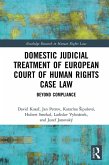The European Court of Human Rights between Law and Politics provides a comprehensive analysis of the origins and development of one of the most striking supranational judicial institutions. The book brings together leading scholars and practitioners to cast new light on the substantial jurisprudence and ongoing political reform of the Court. The broad analysis based on historical, legal, and social science perspectives provides new insights into the institutional crisis of the Court and identifies the lessons that can be learned for the future of the European Convention on Human Rights and Fundamental Freedoms. The European Court of Human Rights is in many ways is an unparalleled success. The Court embarked, during the 1970s, upon the development of a progressive and genuinely European jurisprudence. In the post-Cold War era, it went from being the guarantor of human rights solely in Western Europe to becoming increasingly involved in the transition to democracy and the rule of law in Eastern Europe. Now the protector of the human rights of some 800 million Europeans from 47 different countries, the European system is once again deeply challenged - this time by a massive case load and by the Member States' increased reluctance towards the Court. This book paves the way for a better understanding of the system and hence a better basis for choosing the direction of the next stage of development.
Dieser Download kann aus rechtlichen Gründen nur mit Rechnungsadresse in A, B, BG, CY, CZ, D, DK, EW, E, FIN, F, GR, HR, H, IRL, I, LT, L, LR, M, NL, PL, P, R, S, SLO, SK ausgeliefert werden.









